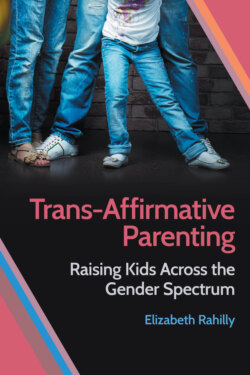Читать книгу Trans-Affirmative Parenting - Elizabeth Rahilly - Страница 11
На сайте Литреса книга снята с продажи.
The Outsider With(out)
ОглавлениеIn her essay “Learning from the Outsider Within,” sociologist and feminist theorist Patricia Hill Collins discusses the unique intellectual insights of women of color scholars. As Collins explains, women of color carry specific cultural knowledge as marginalized “outsiders” within the white, male-dominated spaces of academia, a standpoint that has advanced Black feminist thought, among other spheres of knowledge. My own research experiences, however, could best be characterized as the “outsider without”: I am not transgender, and I present gender-normatively for my sex category most of the time. Equally important, I am not a parent, let alone a parent of a transgender child. My outsider status was further compounded by my role as a sociologist, including the theoretical paradigms I use in that capacity—such as the “social construction” of sex, gender, and sexuality. This theoretical perspective emphasizes the cultural and historical influences on human social experience and identity, not innate biology or genetic dispositions.25 A sociologist is not the typical role, or position, from which most parents seek support and guidance; parents sooner look to mental health specialists, doctors, and professional LGBT educators and advocates outside the academe.
Parents’ fundamental interests in my project were to help spread greater understanding about transgender children and to make the world a safer place for them to live. On that point, we were perennially aligned. However, social-scientific paradigms have had a fraught relationship with LGBT identities and activism. While not necessarily mutually exclusive, many feel that “social-constructionist” perspectives deny essentialist, “born-this-way” accounts for identity, which have been the rallying cry of the modern-day LGBT rights movement. Some scholars argue that social constructionism falsely insinuates something “caused” or “created” personal identities, while biological accounts about an innate, unabiding sense of self ring more true.26 I do not believe these paradigms are contradictory, but my sociological interests in the trans-affirmative parenting phenomenon—including what new understandings about sex, gender, and sexuality might emerge—did not always feel immediately in sync with my participants. This was intimately related to my positionality in the project and the “outsider” status I often felt viscerally in the field, which I address further in appendix II.
There is, however, one “insider” dimension I believe I shared with my actual interviewees: like the majority of them, I am cisgender, gender-normative, and from a white, middle-class, college-educated background. While never discussed outright, our common sociodemographic signifiers likely aided in building rapport, even when I had no personal claims to parenting or to trans experience. I often felt that being cisgender and gender-normative gave me an “in” with my cisgender, gender-normative subjects, who were newly encountering and processing these issues on behalf of their children, at times anxiously so, about which they dialogued with me in interviews.
